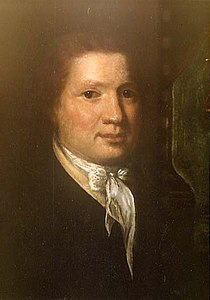Joseph McMinn
| Joseph McMinn | |
|---|---|

Portrait of McMinn by Rembrandt Peale
|
|
| 4th Governor of Tennessee | |
|
In office September 27, 1815 – October 1, 1821 |
|
| Preceded by | Willie Blount |
| Succeeded by | William Carroll |
| Speaker of the Tennessee Senate | |
|
In office 1805–1811 |
|
| Preceded by | James White |
| Succeeded by | Thomas Henderson |
| Personal details | |
| Born |
June 22, 1758 West Marlborough Township, Pennsylvania |
| Died | October 17, 1824 (aged 66) Calhoun, Tennessee |
| Resting place | Shiloh Presbyterian Cemetery Calhoun, Tennessee |
| Political party | Democratic-Republican |
| Spouse(s) | Hannah Cooper (1785–1811, her death) Rebecca Kincade (1812–1815, her death) Nancy Williams (1816–1821, separation) |
| Profession | Farmer |
Joseph McMinn (June 22, 1758 – October 17, 1824) was an American politician who served as Governor of Tennessee from 1815 to 1821. A veteran of the American Revolution, he had previously served in the legislature of the Southwest Territory (1794–1796), and as Speaker of the Tennessee Senate (1805–1811). Following his term as governor, he served as an agent to the Cherokee for the United States government.
McMinn was born in West Marlborough Township, Chester County, Pennsylvania, and was one of ten children. He obtained only a limited rural education, and even in his later years would be described as a "rustic frontiersman." Though raised as a Quaker, he joined the Continental Army during the American Revolution.
In 1786, McMinn moved to Hawkins County, Tennessee, where he had purchased a farm. In 1792, Southwest Territory governor William Blount appointed McMinn justice of the peace for Hawkins County, and McMinn represented Hawkins County in the territorial legislature from 1794 to 1796. He also served as an officer in the territorial militia, eventually rising to the rank of brigade commander.
McMinn was a delegate to the 1796 constitutional convention and helped write the state constitution that came into effect when Tennessee was admitted to the Union on June 1, 1796. He was chosen to deliver a copy of the completed document to the federal government in Philadelphia. He served in the Tennessee Senate from 1797 to 1801, and from 1803 to 1811, and was Speaker of the Senate from 1805 to 1811.
In 1815, McMinn ran for governor against four other prominent state politicians: Senator Jesse Wharton, Congressman Robert Weakley, former speaker of the state house Robert Foster, and fellow state constitutional convention delegate Thomas Henderson. Though his opponents assailed him in the press, McMinn won the election with a plurality of over 15,000 of the 37,000 votes cast. He was reelected in 1817, again defeating Foster, and elected to a third term in 1819, defeating Enoch Parsons.
...
Wikipedia
